Photographs: Dinuka Liyanawatte/Reuters Ameen Izzadeen in Colombo
Sri Lanka-based senior journalist Ameen Izzadeen reports on Sri Lanka's presidential battle, slated for January 26, in which the incumbent faces off a popular war hero
In November 2009, when Sri Lankan President Mahinda Rajapaksa officially declared his intention to seek a fresh mandate for another six-year term, he was getting ready for a one-horse race. A month and a half later, he is getting ready to fight his toughest political battle, which is being described as a neck-to-neck affair, after former army chief General Sarath Fonseka joined the presidential race.
Soon after the military victory over the Liberation Tigers of Tamil Eelam in May last year, jubilant supporters predicted that Rajapaksa would remain the president of the island country for life. Some even called him Maha Rajanani (the great king). In fact, State-run television channels and radio stations regularly played a song that hailed him as the great king who united the country. The song was hurriedly filmed by his cronies weeks before the final victory. Rajapaksa basked in the glory of the victory and did not care to tell those who tried to make him a king that it was unconstitutional.
But the situation today is quite different. Not many people would like to see him as a king, though they may want to see him as their president. There is a craving for democracy along with all its features -- good governance, respect for human rights, a strong parliament and transparency. Rajapaksa's opponents say that people also want to see an end to nepotism, family rule, corruption and waste.
Democracy and welfare State, like truth, were casualties of the war. The Rajapaksa administration was accused of being complicit in abductions, extra-judicial killings and the suppression of the media, but the majority of the people did not protest. When the cost of living escalated and the government was even unable to pass the benefit of the oil price slump to the public, there was nary a complaint. People stomached the price hikes and told the president to pursue the war to the end even if they were starved to death. Such was the support Rajapaksa enjoyed.
Fonseka may pip the president
Image: Presidential candidate Sarath Fonseka holds up a copy of his election manifestoPhotographs: Andrew Caballero-Reynolds/Reuters
But eight months after that great victory, there appears to be some erosion in his support base. With only a few days to go for the election, indications are that the president may even lose. His rival, the war-winning army commander, General Sarath Fonseka, has come from behind and is peaking now. He could even pip the president at the post, many analysts predict.
But the president's supporters claim that Rajapaksa will win with a thumping majority. They rubbish surveys that point to a victory for the general and claim that according to government surveys, Rajapaksa will be the winner.
But opposition analysts have a different story. They point out that Rajapaksa won the last presidential election in 2005 by only a narrow margin. He won that election thanks to a boycott call by the LTTE -- a move that denied United National Party candidate Ranil Wickremesinghe the presidency.
In the elections to the provincial councils held during the last stages of the war and after the war show, say the president's supporters, Rajapaksa had 60 to 70 per cent of the people's vote. They claim that this vote bank is intact and point to the huge crowds that turn out to attend Rajapaksa's rallies.
Both camps hurtle allegations and accusations
Image: Physically disabled former soldiers and veterans attend a rally in the streets to support presidential candidate Sarath Fonseka in ColomboPhotographs: Andrew Caballero-Reynolds /Reuters
A similar claim is being made by supporters of Fonseka. The former army chief is being supported by the main opposition UNP, the Janatha Vimukthi Peramuna, the Sri Lanka Muslim Congress, the Democratic People's Front, which represents Colombo Tamils, and a number of small parties.
UNP supporters, who backed Rajapaksa during the war, have come back to the party. The main Tamil party, the Tamil National Alliance, which acted as the mouthpiece of the LTTE during the war and which now claims to support an united and undivided Sri Lanka, has also extended support for Fonseka. A large number of soldiers and their families will also vote for the general. Therefore, the victory will be Fonseka's, says the opposition.
Political rhetoric apart, a cross-country tour undertaken by some senior journalists indicates that Rajapaksa has a strong support base in the villages in the Sinhala heartland, while Fonseka is popular in Colombo, the coastal belt and the central hills.
As election day nears, both camps have resorted to a no-holds-barred game of mud-slinging. The Fonseka camp has accused the Rajapaksa administration of being corrupt to the core. It alleges that the government took little or no action to get to the bottom of Sri Lanka's biggest tax scam amounting to Rs 4 billion. The government also failed to act on a parliamentary committee report which came up with evidence to show large-scale corruption in state institutions, they say.
Claiming credit for crushing the LTTE
Image: Supporters of President Mahinda Rajapakse cheer during a political rallyPhotographs: Reuters
The Rajapaksa camp comprises the ruling United People's Freedom Alliance, the Sinhala nationalist Jathika Hela Urumaya, the Eelam People Democratic Front, the Tamil Makkal Viduthalai Puligal and the Ceylon Workers Congress, which represents plantation-sector Tamils. The president's allies have hit back at Fonseka, alleging that during his tenure as the army commander, he had bought ammunition and military equipment from a company owned by his son-in-law.
The debate over who should get the credit for crushing the LTTE and ending the decades-old civil war dominates political platforms and talk-shows. Rajapaksa's supporters say the war victory was possible because the president did not bow down to pressure from the international community. It was the president's brother and defence secretary Gotabhaya Rajapaksa who mapped out the strategy for the war and guided the military, they claim.
Fonseka's supporters, using cricket parlance, say that when a match is won, the credit goes to the captain and the man of the match -- not to the selectors.
During debates to claim credit for the victory, the spectre of the LTTE looms large, with one side accusing the other of trying to give a lifeline to the defeated terrorists. The government has alleged that Fonseka and the Tamil National Alliance have signed a secret deal, the consequences of which, it says, will be detrimental to the country's unitary status and territorial integrity.
The world is watching the Lanka polls
Image: President Mahinda Rajapaksa with his Army commander Lieutenant-General Sarath Fonseka in happier timesPhotographs: David Gray/Reuters
The opposition says the government's accommodation of Vinayagamoorthy Muralitharan alias Karuna Amman, a one-time LTTE commander, in the cabinet, is a graver crime. It also accuses the government of using money and gold recovered from the LTTE to run its campaign.
With the Sinhala votes split down the middle, the minority votes are likely to be the deciding factor at the January 26 election. In terms of a political solution to the Tamil question, both main candidates promise to go beyond the 13th Amendment of the constitution -- an amendment that gives devolution of power to provincial administrations. The irony of this promise is that both sides are backed by parties that oppose any kind of devolution of power to the provinces.
As the two rivals in the 22-candidate battle fight it out, the election campaign is also being closely watched by global and regional powers. The United States has said that it is hopeful about improving relations, which were strained due to Washington's criticism of Sri Lanka's human rights record, especially during the last stages of the war.
Although the US has said it has no favourites, Washington appears to be upbeat over Fonseka's poll promises, including greater freedom for the media and independent commissions to oversee the judiciary and other key institutions. A recent report by the US Senate Foreign Relations Committee has urged the Barack Obama administration not to neglect Sri Lanka's strategic importance.
There have been allegations by some government lawmakers that Fonseka's campaign was being funded by the United States and Norway. Both countries have rejected the charge.
India and China are also closely watching the outcome of the election, because of Sri Lanka's strategic importance.What India wants
Image: Congress president Sonia Gandhi with Sri Lankan President Mahinda Rajapakse and his wife ShiranthiPhotographs: B Mathur/Reuters
Like the US, India also claims that it has no favourites, but it is no secret that New Delhi is worried about China's larger-than-life presence in Sri Lanka, especially in the southern tip of Hambantota, a vantage point to keep a check over the happenings in the Indian Ocean. China has also got the lion's share of the post-war development projects in Sri Lanka's north.
Given the UNP's pro-US and pro-West credentials and the JVP's pro-China leanings, India must be entertaining some fears or concerns in case Rajapaksa loses. The president, during his four-year presidency, has become a close friend of leaders of India's ruling Congress party. However, even the opposition acknowledges that India needs to be given the respect it deserves because it has the potential to make or break Sri Lanka.
These concerns apart, the race itself is getting uglier by the day with growing incidents of election violence indicating that the polls will be anything but fair. Rajapaksa, after being hailed as the Second Dutugemunu, the 2nd century BC Sri Lankan king who defeated the Chola king Elara, does not want to be remembered as Sri Lanka's Winston Churchill, the British prime minister who won World War II but lost the first post-war parliamentary elections. Like his opponent, he is confident of winning the polls.
(The writer is a senior journalist in Sri Lanka)
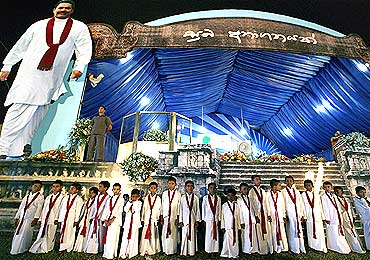

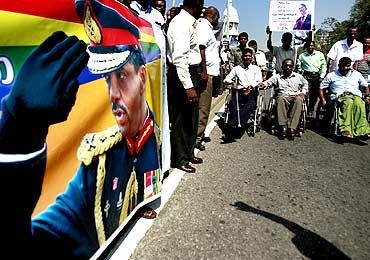
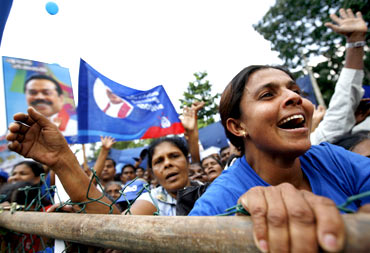
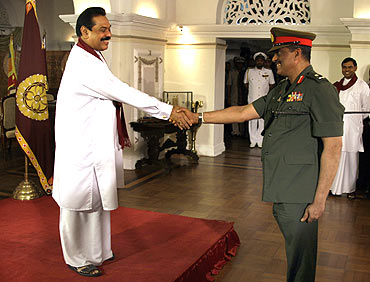
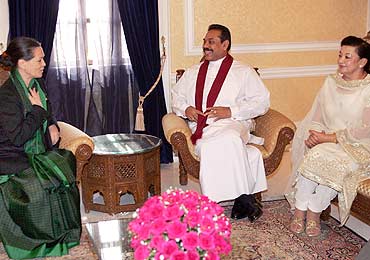
article